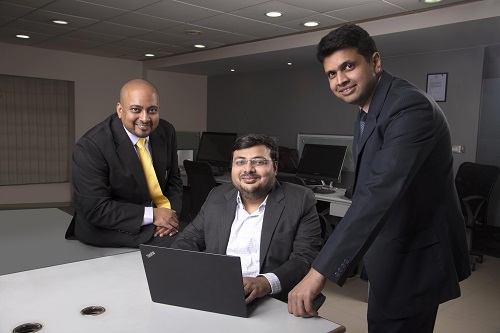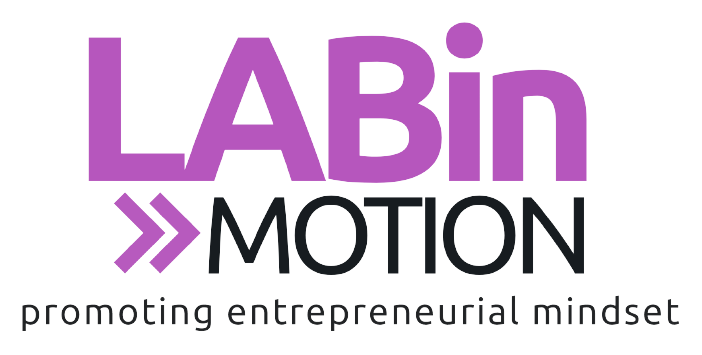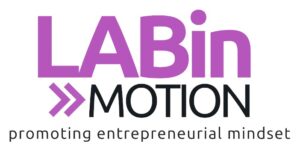Think Analytics (rebranded as Think360 in 2020) started its operations in July 2014, by Amit Das, an MBA from IIM Bangalore (2003), and Suryadip Ghoshal, Economics Masters from IGIDR (2005), who had previously worked together at PwC USA’s Analytics Practice – a quest to find interesting problems where data unlocks the value. In 2015, Monish Salot joined the team as the third co-founder, to sharpen the technology focus of Think.

Surya and Amit are veteran career analytics/data science practitioners. Monish and Amit worked together on exciting technology enabled ideas during their time at 3i Infotech. That’s how the three pillars came together — Monish is a product-centric technology enthusiast, Surya is a quant problem solver, while Amit is business focused, and into building analytics organizations ground up.
We are a full-stack Data Science and AI-focused firm—with a comprehensive 360-degree view of the industry and technology landscape. We have also incubated two ventures at Think360. Algo360 is the largest alternate data product and AI credit score for credit risk, and has scored over 50 million customers, predominantly new-to-credit/ thin file customers. Kwik.ID (or Kwik) is a rapidly growing Video driven KYC and customer onboarding solution with deep AI capabilities.Our firm, through advisory services, enablers, and products tries to:
- Bring agile innovation to enterprise
- Maximize the ROI of data science initiatives
In the early year of starting, we believed there would be three fundamental changes in the way data science evolved in large organizations:
- Convergence of data, analysis, quantitative modelling and technology applications at the heart of business outcomes/use-cases. This led to the idea of building a full-stack data science company.
- Increasing value inside and/or outside the enterprise whenever “difficult” data has to be organized—unstructured, undefined, inconsistent data. Most organizations have more data than they know or can handle.
- Increasing tech proliferation—Software eats the world. AI eats software. Today, almost every quarter, a new tool innovation hits the market. This requires the talent pool to be learning-agile. Also, a lot of the analytics is delivered as productized output or application enabled output.
Our vision was to understand (and visualize) how we could ride these trends to help larger organizations adapt to and move up the digital maturity curve.
Solutions Offered

We have 20+ enabler solutions, and a few products. Our objective has always been clear—pick interesting data heavy problems to solve.
We keep exploring ways to bring cutting edge capabilities to the enterprise. For example, for a Private Equity firm, we worked on exciting NLP approaches that allow the user (client) to mine publicly available information to identify leading indicators of big opportunities in the market.
In the pharma industry, for instance, we have toolkits to solve for data ops and data management problems in the healthcare sector in the United States. This allowed us to build the foundational layer for complex marketing and strategic analytics problems, including market assessments, provider prioritization and pricing simulations. Over the last seven years, we have done 50+ pharma engagements across India and US.
Similarly, in financial services, with Algo360, we have the largest proprietary alternate credit score that competes with and supplements traditional credit bureaus, especially when it comes to underwriting new-to-credit/ unbanked segment customers (where traditional approaches fail). We have a suite of accelerators and toolkits that can help new lenders go live within 2 to 3 months across digital channels. Our API management solution – FlowXpert – is a low code solution for partner and application management.
We have also worked on some really complex predictive maintenance and anomaly detection models in the oil & gas industry that can predict equipment shutdown even 12-14 hours in advance, along with a classification of the anomaly—allowing field engineers to proactively mitigate risk and reduce business losses.
The Top 2-3 Challenges
We have been lucky to have fewer problems than most startups.
- Being sales-oriented: As analytics professionals, one of the biggest realizations is the amount of sales you have to do if you’re building a firm. Shamelessly, tirelessly, continuously. You are always selling. You have to be ready to sell if someone wakes you up in the middle of the night. Takes a bit of adjusting to.
- Managing people/expectations: We often make the mistake of expecting all our team members (early or late hires, doesn’t matter) to be entrepreneurs—comfortable with ambiguity and ready to grind it out. Practically, a lot of people are just looking for specific directions about what is expected of them. As co-founders, lately, a big part of our life has been about trying to be specific and clear about our expectations. Earlier, we were prone to off-loading our life’s ambiguity on the team. I think it was unfair!
- Managing the external and regulatory environment and its impact on business: When we built Algo360, we thought we had the greatest idea ever. We ticked all the boxes around data handling, customer interest, privacy, and so on. It was all centrally architected in our thinking. Still, with Hon’ble Supreme Court’s verdict that Aadhar could not be used in many of the customer onboarding processes, a lot of digital lending platforms lost their raison d’être. It took us almost six months to redesign some of our solutions and help our clients (and us).
- Pondering on funding—to raise or not to raise : We have been profitable and cash-flow positive from day 1. So, a question about fundraising seems trivial depending on which side of the fence you are on. Most entrepreneurs (including some that come to us for funding) seem to think funding is the only real proof of success. On the other hand, many entrepreneurs, including fellow IIMB alums told us that we should never raise capital if we don’t need the money. And there were some conversations, where we were told that we don’t have funding because we must not have been good enough for it! And so, periodically, we still go through founders’ confusion about raising capital just to get some form of external validation!
Top 2-3 Learnings/Insights
Once a consultant, always a consultant, even if you run your own company. Here are my three cents:
- Don’t build for others: You can’t. It is so easy to get caught in the noise in the startup ecosystem and every founder’s confident sermon about the “right thing to do”, that we forget there is no one single template for building organizations. We have seen startups increasing their burn because they are trying to emulate the PR and advertising driven strategy of someone else.
- Accept your true nature: We tried building a B2C product within Think–VITO. The design, speed, pressures, values, operations of such a business are fundamentally different from a B2B business (especially one focused on enterprise segment). We shut down VITO in about 12 months. There was a lot of learning about who we are and what kind of business we want to be.
- Understand who to hire: Entrepreneurial talent is different from exceptional talent. For instance, at IIM Bangalore, pretty much the entire batch was exceptionally sharp and intelligent, capable of delivering the goods over and over again. Many of them are not well suited to be entrepreneurs, and they are far more successful and happier compared to many entrepreneurs. When we started hiring for growth, we would often confuse entrepreneurial talent with exceptional talent. For certain roles, we needed people who could focus on execution and delivery. But we ended up looking for people who were comfortable with ambiguity and with ambitions to have a startup of their own. Bad idea!
Recognition/Awards
We have won a few along the way. We won the SBI hackathon, were the winners of Maharashtra Fintech Hackathon, were identified as one of the emerging analytics startups in 2017, were invited to demo at Finovate, shortlisted for India Fintech Awards, speak at Strata Conference, etc.
The most significant recognition, however, has always been client success stories and referrals—every large account today has brough us to at least one more client.
Any “Aha” Moments
Specifically, the two most significant moments for us were:
- When we shut down an experimental idea—VITO—because we felt that the idea of omni-channel couponing and deals marketplace will take 7-8 years+ to have positive economics or significant monetization. We realized a significant thing about the kind of entrepreneurs we wanted to be.
- When we first reached cash reserves of INR 1 crore+ sometime in the second year of operations. There was a certain kick in that moment to realize that we are onto building something that can create value for its constituents.
In short, our entrepreneurial journey is a little different from the high velocity, high orbit journey that gets a lot of attention. But it comes from the notion that we were reasonably sure about what we wanted to build. We want each of our ideas to be sustainable, profit generating in the medium term. We were comfortable slowing down to critically evaluate a clear and present signal of something being wrong. High velocity startups often don’t get that liberty. We want to use the surpluses to invest in new ideas, internal or external, and keep supporting innovation. We have already been successful thrice – in our consulting business, in incubating Algo360 four years back and in developing Kwik.ID in late 2019. We are in a position where we are taking external investment bets as well. We have also failed a few times. And, we have moved on to the next set of ideas and innovations.






